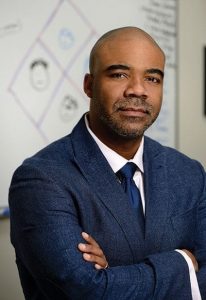
Kali-Ahset Amen
The Andrew W. Mellon Foundation on Wednesday awarded a $4.4 million grant to a team of scholars at Johns Hopkins University that is investigating the history of academic racism in higher education and building a citywide network to preserve Baltimore's African American history, culture and arts.
The project, "Inheritance Baltimore: Humanities and Arts Education for Black Liberation," will pioneer methods of teaching, research, preservation, and doctoral education that works with Black institutions to foreground the experiences of Baltimore's Black community and combat institutional racism. The project will also document and preserve the ways African Americans attained knowledge within and outside of academic disciplines.
A collaboration between the Program in Racism, Immigration and Citizenship; the Billie Holiday Project for Liberation Arts in the Center for Africana Studies; and the Sheridan Libraries and University Museums, Inheritance Baltimore will focus on three goals:
- Researching and chronicling the history of the African American community in Baltimore and of the impact of racism on academic disciplines in higher education and at Johns Hopkins in order to fill in missing or excluded elements in traditional historical records;
- Expanding the Baltimore Africana Archives Initiative that launched two years ago to offer Johns Hopkins scholars opportunities to take their research to the city's Black churches and communities and to preserve archives in jeopardy of being lost; and
- Developing a doctoral curriculum that incorporates city residents who are experts in local history to advance Black freedom education already underway in the city, and to develop a professional pipeline of Johns Hopkins PhD students and future faculty who are trained to combat racism in American institutions, including at universities.
Inheritance Baltimore aims to elevate the role of the humanities in the continued revitalization of Baltimore and to advance research and record-keeping in support of reparations. "We want to cultivate the historical legacy of Black people in the city and in this region where so many African American archives are either incomplete or are being actively discarded," said Lawrence Jackson, a Bloomberg Distinguished Professor of English and History. "The university actually has a responsibility to direct resources toward the historical preservation of the complex features of Black life in the city of Baltimore."

Lawrence Jackson
Jackson is founder and co-director with Sociology professor Kali-Ahset Amen of the Billie Holiday Project for Liberation Arts, which will use the Mellon funding to host researchers, artists, archivists, and local elders for public engagement events with community groups - especially with Black churches that have been the vital repository for critical records. The project includes seminars conveying practices for securing and digitizing the works of arts, history and literature in their possession.
"Our work has already begun with Black churches, which have been the keepers of history for so long," said Amen, the project's principal investigator. "We want their needs to drive this effort."
On and off-campus workshops will bring together university affiliates and local keepers of Black public history. These sessions will help preserve oral histories and personal documents of longtime residents, ensuring the durability of a history that conventional research rarely seeks or obtains. These efforts include the establishment of "Living History" fellowships, a residency program featuring local elders who will mentor students and deliver talks and discussions at Johns Hopkins and area HBCU campuses.
Archiving efforts will include a portable digitization lab that can be transported to participating community groups. Gabrielle Dean, a special collections curator for the Africana Archives, and Joseph Plaster, a public humanities specialist for the Sheridan Libraries and University Museums, represent Inheritance Baltimore's library research and preservation team. "We aim to train a local cadre of archivists and curators, comprising students and Black residents of the city, to bolster African American presence in the field as they assemble the materials to write a more complete account of Baltimore's past through an archival research consortium," Plaster said.
The Mellon Foundation grant was awarded as part of its $72 million "Just Futures Initiative," which seeks to improve equitable access to higher education, champions efforts to improve diversity among professors and supports new research methods to chronicle untold histories of the nation's racist past.
President Ron Daniels applauded the vision of Inheritance Baltimore and its Mellon Foundation grant.
"Johns Hopkins University is honored to be part of the Mellon Foundation's innovative 'Just Futures Initiative' for the arts and humanities and to receive this generous grant in support of our faculty as they seek to forge new partnerships with our neighbors in Baltimore and to deepen our understanding of our history," Daniels said. "Under the leadership of Dr. Kali-Ahset Amen, Dr. Nathan Connolly, and Dr. Larry Jackson, the interdisciplinary 'Inheritance Baltimore' project provides another important opportunity and framework to research and address the racism that continues to plague our institutions, our communities, and our nation."

Nathan Connolly
The Program in Racism, Immigration and Citizenship (RIC) anchors Inheritance Baltimore's reparations efforts in academic departments and doctoral education. Under RIC's leaders, Nathan Connolly and Stuart Schrader, the project supports doctoral and faculty research on the racial history of the disciplines. It explores how academic inquiry has long been shaped by the exclusion and marginalization of Black knowledge and expertise.
Connolly, a History professor, said the Mellon initiative arrives at a time when scholars across the university were looking in 2020 to "rise to the national moment," to respond creatively to the largest direct action protests against institutional racism in American history. "Over the last century, Johns Hopkins University, like most elite U.S. institutions, rarely stood openly against segregation and racism, especially racism within its academic units," Connolly said. African Americans, as a result, were forced to educate themselves in research and narrative methods that often "ran parallel to and separate from what was going on in the Ivory Tower," he said. Independent educational initiatives like the Freedom School movement of the 1960's Civil Rights era represent ongoing legacies of this history.
Inheritance Baltimore will work with Baltimore's Orita's Cross Freedom School to develop a new curriculum for combating racism in education, and to teach doctoral students the methods of Afro-centric education.
Between its curatorial, research, and educational elements, Inheritance Baltimore aims to repair legacies of intellectual racism directed at Black Baltimore's children and elders, as well as the wider Black World. It preserves our city's shared Black inheritance while aspiring to redirect older concentrations of resources that have long been denied the keepers of that inheritance.






